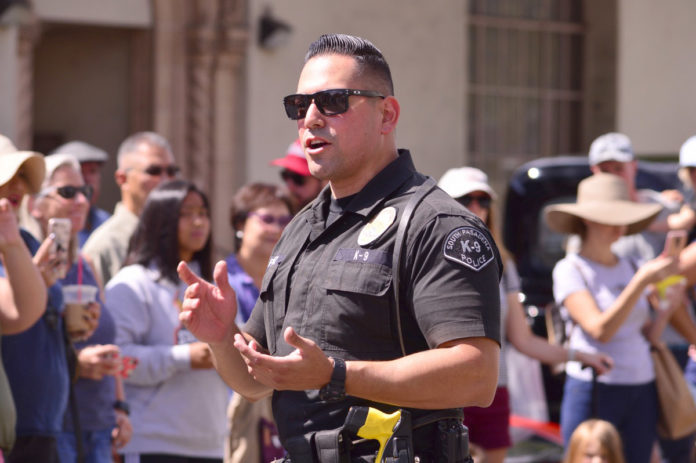
The City of South Pasadena and two of its police officers have denied all substantive allegations by, and raised a raft of affirmative defenses against, a resident of Bellflower who filed a civil rights claim asserting he was the subject of a false arrest. Represented by Beverly Hills attorney Kevin Conlogue, Alhassan Larry Umar, an African American from Ghana, alleges he was pulled over because he is black and illegally detained.
Umar also accused the SPPD of a “pattern, practice and custom” of allowing its police to racially profile minorities, falsify arrest reports, suppress evidence and promote dishonesty by failing to investigate or discipline officers who engage in unlawful conduct.
The plaintiff says that at about 1:24 a.m. on Dec. 2, 2018 Officer Chris Perez pulled him over at Huntington Dr. and Maple St., immediately accused him of being drunk and ordered him out of his car. Officer Jose Corney then arrived and they both “repeatedly” refused Umar’s request for a Breathalyzer test. They handcuffed and took Umar to San Gabriel Medical Center where he tested negative for drugs and alcohol, and then to the South Pasadena Police Station where he was detained for seven hours.
Six months later a judge dismissed the case. Umar says that in addition to being stuck with a $395 towing fee, the officers’ conduct left him “substantially physically, mentally and emotionally injured,” and that he “endured great physical, mental and emotional pain and suffering.”
As part of its argument that Umar’s case is part of a malicious pattern by city police, the lawsuit cites four instances over the past 13 years—including the Vanessa Marquez case–in which it states that South Pasadena police falsified reports and/or made illegal arrests but were subjected to no discipline. It claims that every lawsuit filed against the city for unlawful seizures under federal civil rights law have been by persons of color.
“These disproportionate lawsuits evidence a pattern, practice, and custom of City and SPPD of racial profiling citizens resulting in falsified reports to cover up said unlawful actions,” the lawsuit states.
The Los Angeles District Attorney’s office recently cleared the city’s police of any wrong doing in the Marquez shooting, though the SPPD is still completing an administrative review of the incident. One of the other cases Umar cites was settled and another is on appeal.
In a March 5 reply filed on behalf of the city and the two officers by a Santa Ana law firm, the defendants said Perez legally pulled Umar over on suspicion of driving under the influence. But it denies allegations “regarding the characterization, sequence of events, and/or the facts of the encounter.” It asserts Umar’s detention and arrest were based on “reasonable suspicion” and goes on to deny “generally and specifically each and every” allegation in the suit, including that police violated Umar’s First, Fourth or Fourteenth Amendment rights.
“The actions of the City and its employees in all respects were reasonable, proper and legal.”
The City also argues that because he was a parolee when he was arrested and imprisoned, Umar “could suffer no injury from any alleged false arrest or imprisonment.”
Moreover, any injury Umar suffered “was due to and caused by” his own negligence and carelessness, the reply states. But it said if any liability is found on the part of the police, any judgment should be only “in an amount proportionate to the extent and percentage” by which the officers’ actions contributed to those injuries or damages.
Calling it a “mischaracterization,” the City denied Umar’s assertion that the City has the authority to adopt policies and practices affecting the SPPD and its various operations. The city’s attorneys did not return calls seeking to inquire about this denial.
Umar outlined four claims for relief against the officers: unreasonable search and seizure; malicious prosecution; deliberate falsification of evidence; and deliberate or reckless suppression of evidence—and one against the city: liability for unconstitutional municipal policy. He seeks a jury trial and general, special, and punitive damages.
The city’s reply lays out 47 affirmative defenses, including various theories of immunity and liability, the reasonable nature of the officers’ action, infirmaries in the petition and that the claims are barred by doctrines such as laches, judicial estoppel and “unclean hands.”
The case was initiated late last year in Los Angeles Superior Court but was removed to federal jurisdiction. It was assigned to Judge Cormac J. Carney, who has yet to establish a schedule.















.png)







“In a March 5 reply filed on behalf of the city and the two officers by a Santa Ana law firm…”
I’d be curious to hear why Colantuono, Highsmith & Whatley — the city attorney’s law firm — isn’t working on this case.